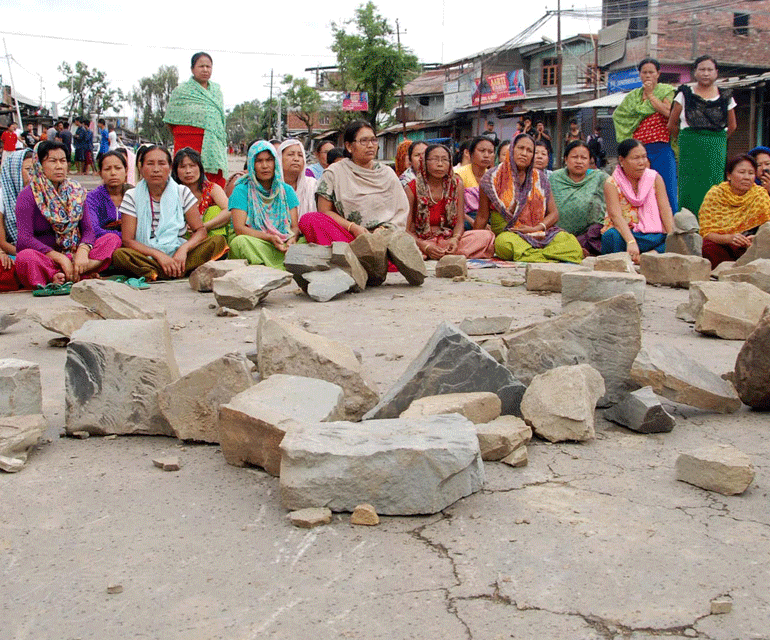Why ILP Irks me

Indira Laisram
About two years ago, when my Australian husband and I were making our travel plans to Mizoram, we visited the Mizoram House in New Delhi to get the requisite permissions. I was very sure that being a north-easterner I would not need any paper work done and that my husband would be the one required to fill the necessary formalities. Turns out, he (by virtue of being an Australian) didn't need any permission to visit the state. But I needed one. The permission in question was the Inner Line Permit (ILP), the'official travel document issued by the Government of India to allow inward travel of an Indian citizen into a protected area for a limited period'. It was a smooth process of course but it just didn't make any sense. However, we thoroughly enjoyed our visit and the hospitality of our friends there.
My Google knowledge tells me that ILP is an offshoot of a policy long introduced by the British, the Bengal Eastern Frontier Regulations Act passed of 1873, to prohibit non-indigenous people from settling down in certain areas of the north east region so as to preserve cultural heritage. Today, the ILP is in force in the three states of Mizoram, Arunachal Pradesh and Nagaland. Apparently, this helps the governments keep a check on the number of non-resident labourers, business owners and other employees/employers residing within the state.
And now it seems Manipur too wants the ILP enforced. Reading about the great ILP unrest in the state sitting in Melbourne, I was having discussions with my Manipuri friends some of whom have just returned from their annual visit home. My immediate question was why would we want the ILP in today's world when open borders have such an upside to it. Of course, mine is naïve logic. In the political and economic context, Manipur is seething in problems. There are far-deep seated issues, I am told and everyone is ranting about how important ILP is.
To this effect, the state assembly has passed three bills – Protection of Manipur People Bill; the Manipur Land Revenue and Land Reforms (7th amendment) Bill; and the Manipur Shops and Establishments (Second Amendment) Bill – to regulate the influx of outsiders into the state. Suddenly a state which is no stranger to inter-ethnic clashes is once again on the boil. Many lives have been lost.
So what my non-resident Manipuri friends had to say was this: schools were shut for a long time, daily wage labourers were suffering, certain places were sensitive to go and work in, frequent bandhs and curfews, those who were not well were not allowed to go to hospitals, rampant arson and looting. In short, a protest gone horribly wrong as the ILP became a mass movement. One friend who started a project had four people working under him. Out of 60 days, the workers attended just 15 days of work, but obviously the friend still had to pay them. For small enterprisers, quite a big setback.
Another friend said, "When we think of ILP we mainly connect it to illegal Bangladeshi migrants coming in to settle in the region but great pockets of the state, say, Churachandpur is now swelling in population because of huge influx of other tribal population from the Burmese border. And they are not looked at with animosity because of the shared culture of lifestyle, ethnicity, food etc." For the tribals, the threat in terms of demographics and land ownership comes not from outsiders; it comes primarily from the Manipur plainspeople. This little picture tells the larger truth about just how complicated things are.
My layman opinion is what reinforces my worry as a global citizen, that this sort of xenophobic fear is not confined to Manipur or the northeast. Australia, where I now live, too has its own issues with taking illegal migrants. Hundreds are detained in detention centres, but there is a mechanism to process their status, which often takes years.
I don't understand the ILP. I know there are scholarly opinions and articles written on the subject and it is not something I can talk about as an expert. What I do think is that adopting the ILP gives credence to the notion that free movement within one's country should be restricted. That to me undermines national cohesion. What I do believe in is that illegal migrants must be checked because they feed into an ambiguous employment opportunity where such migrants are hired cheaply, and take on local jobs. But again, must we criminalise those who respond to such opportunities? It is not easy to analyse. It suffices to say that Manipur has enough problems of its own, the ILP issue has added more weight than it can tackle.

















